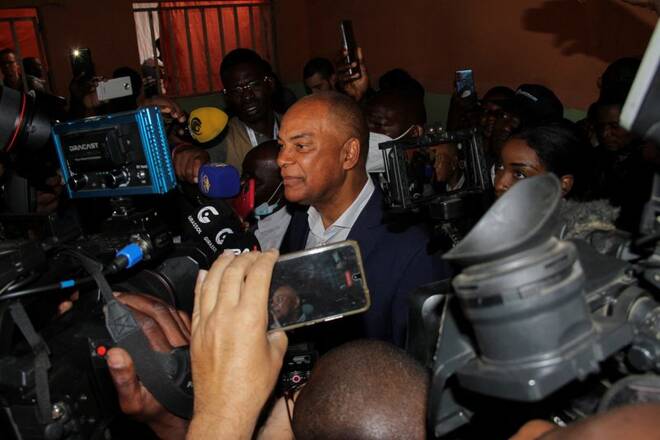Advertisement
Advertisement
Angola’s main opposition party challenges election results
By:
LISBON (Reuters) - Angola's main opposition party has submitted a legal complaint challenging the electoral commission's finding that the governing party won last week's election, a letter seen by Reuters shows.
By Catarina Demony
LISBON (Reuters) -Angola’s main opposition party on Tuesday said it had submitted legal complaints challenging the electoral commission’s finding that the governing party won last week’s election but the body said it had not received any complaints related to it.
In a statement on Tuesday, the opposition party, the National Union for the Total Independence of Angola (UNITA), said the complaints would have the effect of suspending the declaration of results of the vote.
Commission spokesperson Lucas Quilundo told reporters none of the complaints it had received so far were related to the final election results, but later said he had rejected two complaints filed by UNITA related to the electoral process and the results.
After the most closely fought election since independence from Portugal in 1975, the commission declared the ruling People’s Movement for the Liberation of Angola (MPLA) the winner, prolonging its nearly five decades of uninterrupted rule and handing President Joao Lourenco a second term.
Just over 51% of voters had supported the ex-Marxist MPLA, it said. UNITA, its longtime opponent and former civil war enemy, took about 44%, its best result ever, according to the commission.
A letter sent by UNITA, seen by Reuters, said the party’s representative at the commission “was not granted the right to record in the result sheet his complaint about the electoral results”. The letter said the representative rejected the results.
“The national results were already approved without being challenged so the matter could not be taken into consideration,” Quilundo said, explaining why the complaint was rejected.
UNITA leader Adalberto Costa Junior has repeatedly said in the past few days that he does not recognise the results of the vote and that complaints have been filed.
“UNITA reiterates that it will not recognise the results announced by the National Electoral Commission until the complaints already in its possession are resolved,” the party said in its Tuesday statement.
Under Angola’s rules, if UNITA wishes to challenge the results it must first lodge a complaint with the commission.
Another UNITA complaint asking the commission to review the results in the province of Moxico was rejected, Quilundo said, explaining that the person who submitted the complaint did not have legitimacy to do so.
Quilundo did not mention a complaint submitted by UNITA on Aug. 26 asking for Luanda’s results to be reviewed.
UNITA spokesperson Alcino Kuvalela told Reuters the party would submit the complaints again and if the commission rejected them again, UNITA would have no option but to take the matter to the Constitutional Court, which must rule within 72 hours of receiving them.
Angola’s Constitutional Court is led by Laurinda Cardoso, a former MPLA member who was appointed by Lourenco in August 2021. Analysts say the MPLA controls the court but Lourenco says it exercises its powers independently.
Former Constitutional Court President Manuel Aragao resigned last year after he voted against constitutional amendments which he described as “suicide of the democratic rule and law”.
Angolan political analyst Edmilson Angelo said UNITA was likely to eventually accept defeat but would continue to reject the gap in votes.
“This will allow them to be coherent with their position on the electoral process while at the same time soften the feeling of disruption which may erupt,” Angelo said.
Analysts say any dispute could ignite street protests but that has not happened so far.
The MPLA and UNITA, formerly anti-colonial guerrilla groups, were on opposing sides of the post-independence civil war that lasted until 2002, when Angolan troops killed UNITA’s rebel leader, Jonas Savimbi.
Lourenco, 68, has pledged to press on with reforms in his second term, including privatising poorly run state assets and continuing to clean up corruption after investigating wealthy and powerful members of the Dos Santos family.
The MPLA’s Jose Eduardo dos Santos, who died in Spain in July, had ruled Angola from 1979 until 2017, when he handed power to Lourenco.
Lourenco’s reforms have so far failed to create a fairer distribution of Angola’s vast oil wealth – it is Africa’s second largest producer – which remains mostly in the hands of a few well-connected MPLA officials.
(Reporting by Catarina Demony; Writing by Francesco Guarascio; Editing by Bradley Perrett, Angus MacSwan and Sandra Maler)
About the Author
Reuterscontributor
Reuters, the news and media division of Thomson Reuters, is the world’s largest international multimedia news provider reaching more than one billion people every day. Reuters provides trusted business, financial, national, and international news to professionals via Thomson Reuters desktops, the world's media organizations, and directly to consumers at Reuters.com and via Reuters TV. Learn more about Thomson Reuters products:
Did you find this article useful?
Latest news and analysis
Advertisement
